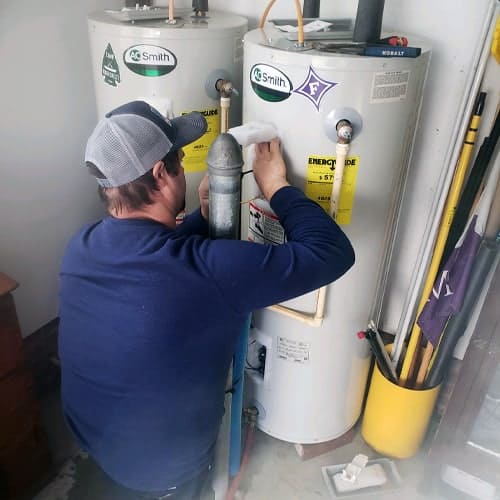Key Steps for Residential Property Owners Dealing with Faulty Hot Water Systems
Key Steps for Residential Property Owners Dealing with Faulty Hot Water Systems
Blog Article
How do you really feel in regards to Broken Water Heaters?

Whether it is located in the basement or a separate room, busted water heating systems can trigger stress and anxiety. Having no hot water supply is additionally problematic.
Call the Plumber
After doing the very first two safety steps, you should call your plumber to come right away to take care of a ruptured water heating unit. There are normally signs that your aging water heating system has sediment build-up in the interior.
Instead, as soon as you spot these indicators, have actually a professional come to examine your water heating system tank. Normally, water heaters have a life expectancy of concerning 8 to 12 years.
Cut Off the Cold Water Supply
Cut off the storage tanks tap water supply from the source. This goes from your main water line into the storage tank. When your storage tank remains in good condition, the cold water stops filling when the storage tank is complete. However given that it is dripping, the water will certainly remain to stream. Close the valve located at the top of the heater. Turn this clockwise to close it off. If you can not discover it or reach it, you need to shut off that major water supply line outside your property.
Shut Down Power Source
Before calling the plumber, shut off a gas water heating unit by transforming the temperature dial. This will protect against electrocution, particularly if there is a leak as water is a conductor. Normally, the heating aspect shuts off when the water strikes a particular temperature level.
Tidy up Home
After calling the plumber, file damage by keeping in mind and images so you can assert your homeowner's insurance policy. From there, begin the immediate cleanup. Secure any type of essential personal belongings to avoid additional soaking. After that, get rid of any kind of standing water to stop mold and mold development. If you have a completely submersible water pump, make use of that to drain the water. Or else, the conventional pail method will certainly additionally function. Try to wipe out everything, consisting of walls and walls. If you have an electrical follower as well as dehumidifier, keep them running to keep air flowing. This will help prevent mold development.
Bear in mind, if you discover any kind of issues with your hot water heater, call the pros right now. You can not take this problem lightly since a malfunctioning thermostat can increase water temperature to a dangerously high level, resulting in accidental burns. A broken heating unit pressure safety valve can likewise trigger an explosion. For ideal results, obtain a yearly check so your device gets inspected, cleansed, drained, and refilled, assuring optimal efficiency.
After doing the very first 2 safety steps, you must call your plumber to come right away to take care of a burst water heating system. Instead, as quickly as you find these indications, have actually an expert come to examine your water heating system tank. Before calling the plumber, shut off a gas water heating unit by transforming the temperature level dial. If you have a submersible water pump, make use of that to drain the water. Remember, if you see any type of concerns with your water heater, call the pros right away.
When You Should Turn off Your Water Heater
When the main water supply is shut off
There are many circumstances in which the main water supply is turned off. When this happens, many homeowners wonder if it’s safe to keep the water heater on of it should be shut down too.
In most cases, it may not be necessary to turn off the water heater, but it also won’t hurt, either. However, there are two reasons when you should turn off the unit to prevent too much pressure or heat from building up inside the tank:
When there’s a leak
If your water heater springs a leak due for a variety of reasons, including age or a valve malfunction, you should always turn off the unit and shut off the water supply until the issue is resolved.
https://www.libertyplumbingheatingandair.com/blog/when-you-should-turn-off-your-water-heater/

We were made aware of that report on What Do You Do When Your Water Heater Bursts? through a good friend on a different web property. Sharing is nice. Who knows, you might be doing someone a favor. Bless you for your time. Visit again soon.
Schedule Here Report this page